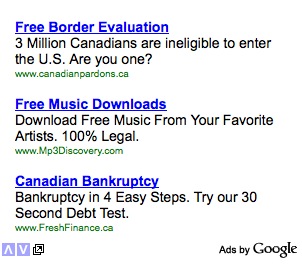In lieu of something significant (has it been a month already? I swear, between blogging and bathing, I don’t know how anyone gets anything done,) I found the Google ads around the feed around this story about being sued by the RIAA somewhat amusing (bear in mind I’m in Canada):

It’s been about a month since I read Appetite for Self Destruction, and I was almost feeling optimistic about the music industry, but something’s been holding me back from posting about it. Probably the fact that they still make a business around suing their customers. And how the music retailers (what’s left of them, anyway) think downloaders should be sued but then are shocked when they’re asked to pay fees for playing music in their music stores.
The fact of the matter is, there’s basically an infinite amount of music out there. Check these poorly-researched stats: as of April 2007, Myspace had 25 million songs. Hosted. I have no idea how many of these were duplicates, but that was over two years ago, so cut me some slack and assume a lot more indie bands have uploaded their songs to the service since then.
This means that if I lived to be 100 and listened to Myspace tracks nonstop, I still wouldn’t hear them all.
Once there’s more than you can use in a lifetime, I reckon that’s infinite.
Sure, if we crowdsourced the problem, the population of Canada alone could listen to the whole inventory in about 3 minutes.
But we wouldn’t have any shared stories.
Music gains power when more people listen to it, and that’s the blessing and the curse for the industry: they don’t have the same issues of scarcity-based pricing that other companies have. In a certain sense, the more people that listen to a track, the more valuable it becomes, while at the same time the cost of distribution stays relatively static on a per-listen basis. The margin against this hypothetical value grows with every listen.
While some companies have experimented with the Dutch auction style of pricing, like how Amie Street prices songs progressively higher as they get more popular, encouraging early music discovery and adoption, you’ll have a hard time finding a consumer who’s willing to pay $1000 because they’re the 70th million person to “discover” a track. Indeed, in today’s market, people who are late to the party usually get a discount on items that aren’t hot anymore.
I don’t know the legal term for the argument (it’s probably in Latin,) but people being sued by the RIAA need to figure out how to explain how while they might have 60,000 tracks on their hard drive, the number they would have downloaded if they were worth even a penny each (to the downloader) would be about 6.
In the meantime, I’m considering taking Google’s advice and downloading as much as I can before declaring bankruptcy. You know, as long as I can still enter the USA. I hear they have vegan doughnuts.
Leave a Reply